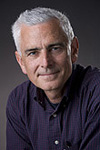Cosmic corps of discovery
 |
|
Craig Hogan
|
Craig Hogan, head of the Center for Particle Astrophysics, wrote this column.
At Fermilab, we like frontier metaphors. Our founding director, Robert Wilson, who actually came from Frontier, Wyoming, established Fermilab's own herd of bison (not to be confused with bosons) to remind us daily both of the pioneers who explored the wild continent and of the boundless opportunities that still remain for scientific discoveries on the expanding frontier of knowledge.
Nowadays, we even talk about the different frontiers of particle physics research. Over the last year, a throng of physicists participated in a extensive strategic exercise, called the Community Summer Study 2013 (or "Snowmass" for short), to plan the future of the field. The process peaked during an intense week-long gathering this summer and has now produced a series of collectively written white papers that survey ambitious prospects across all the frontiers.
Like real pioneers, we're setting off on an expedition of tracking, hunting, exploration, mapping, prospecting, mining, surveying, measurement and, hopefully, discovery.
The pioneer metaphors work particularly well on the Cosmic Frontier, where we study fundamental physics all across the giant, extreme laboratory of the cosmos and deploy experiments in wild, remote places all over our planet. The Community Summer Study report lays out some exciting directions to explore:
· We are in hot pursuit of dark matter, the enigmatic stuff whose gravity binds our galaxy together. Fermilab teams run several experiments that seek to capture rare interactions of those elusive particles with normal matter. In the next decade, larger experiments and a variety of search techniques for different kinds of particles will follow their tracks all the way into the sunset — or, at least, to the ultimate limit set by a background of neutrinos from the sun, the atmosphere and distant supernovae.
· We comprehensively survey the universe to study dark energy, the invisible stuff that fills the space between galaxies and drives them apart. At Fermilab, we now lead and operate the Dark Energy Survey, the largest and deepest imaging survey of the cosmos ever made. Future survey projects with more advanced capabilities — the Dark Energy Spectroscopic Instrument and the Large Synoptic Survey Telescope — will mine a wealth of knowledge in new lodes of data.
· New projects will create large, deep and detailed maps of polarized fluctuations in the cosmic background radiation, the light left over from the big bang. That information will let us study other new physics, such as the sum of neutrino masses and the properties of inflationary forces that powered the early cosmic expansion. We could discover possible new forms of energy such as "dark radiation" and possibly even quantum activity of space and time in the first moments.
· The highest-energy particles come from space, and measurements of many different kinds of those rare events will tell us about their history and interactions, properties of their distant cosmic accelerators and, possibly, indirect signs of dark matter.
· One of our experiments right here at Fermilab, the Holometer, seeks to discover new properties of space itself that may emerge from its properties at the smallest scales. It is included in the report but doesn't really fit the Cosmic Frontier name or the rustic pioneer theme. For this one, perhaps we could adopt another popular metaphor: "Space, the Final Frontier."
|